


WITH




WITH
PRESENTED BY
We’re all told that that aging is an inevitable decline into disease and disability. Fountain of Youth®, a podcast from Growing Bolder in partnership with the National Senior Games and Humana, smashes negative stereotypes and delivers an inspirational message that transforms lives.
Hosted by world record-setting masters athlete, Emmy Award-winning broadcaster, and Growing Bolder CEO Marc Middleton, Fountain of Youth shares the secrets to happy, healthy, and active aging through the stories of ordinary people living extraordinary lives; men and women of all ages, sizes and abilities who are redefining what’s possible for all.

SUBSCRIBE NOW and learn the secrets to active aging!
podcasts.apple.com


open.spotify.com

audible.com

Visit GrowingBolder.com daily for inspiring stories to help you start Growing Bolder

Get a daily dose of inspiration curated from our most popular social media posts.

Check your local listings or watch new episodes of "Growing Bolder" and "What's Next!" at GrowingBolder.com/tv

Fast-paced, entertainment hour that will leave you excited about the possibilities in your life, now available on most podcasting platforms and GrowingBolder.com/radio-podcast.
DON’T FORGET TO FIND US ON OUR SOCIAL CHANNELS
Follow us @GrowingBolder
CREATIVE DIRECTOR Katie Styles

PRODUCTION DIRECTOR Jill Middleton
EXECUTIVE PRODUCERS Lynne Mixson & Tim Killian
DIRECTOR OF PHOTOGRAPHY Mike Dunn
CONTRIBUTING WRITERS
Bill Shafer, Chef George Vogelbacher and Vanessa Skinner
GROWING BOLDER PRESS
CHIEF EXECUTIVE OFFICER Marc Middleton
GENERAL COUNSEL Michael Okaty, Foley & Lardner LLP
PARTNER RELATIONS Sam Koubaissi
COMMENTS
Contact us via social media @GrowingBolder or email us at feedback@GrowingBolder.com
ADVERTISING AND MEDIA SALES
For information about advertising and sponsorships, email Bijou Ikli at partnerships@growingbolder.com
CONNECT
14 A LOVE STORY, 74 YEARS IN THE MAKING Bernice and Irving Locker Share Their Story
24 MAKING ADULT FRIENDSHIPS
3 Keys to Making Friends, and The Common Mistakes We All Make
36 EMPOWERED CONNECTIONS
MTRA Provides Therapeutic Horseback Riding and More
44 PAULINA PORIZKOVA: NO FILTER A Supermodel Shares Her Story, Her Way

DEFY
34 SOMEONE ALWAYS HAS IT WORSE, RIGHT? This is Her Story
40 AREN’T YOU GLAD TO BE ALIVE NOW? Dr. Sylvia Earle’s Passion for Our World
42 FIGHTING TO THE FINISH Cancer Survivor Runs to Show Others They Can Persevere, Too
23 TREASURE TROVE
Caring Transitions Recovers Wedding Ring on the Anniversary of a Mother's Passing 46 MENTORS MAKING THEIR MARK ON THE NEXT GENERATION
"That you don't always have to respond, and that time can be a good teacher."
–Priscilla W."Forgiveness is not only possible, but necessary for the ability to move forward, and for peace of mind. I appreciate and am grateful for peace of mind."
– Peggy S. R."My late mother-in-law, Norma."
–James M."My uncle Al, who lived and took care of his parents most of their lives (grandfather lived to 102). He freed up his sisters to live across the country raising their own children and living their own lives."
–
Ginny L."ME, myself and I."
–
Milt P."Quiet, nature and rest."
– Norma
D.This month in Growing Bolder we celebrate older women of influence who are rapidly expanding the boundaries of possibility in nearly every human endeavor. They’ve become the role models that they never had, which makes their contributions even more remarkable.
They didn’t benefit from someone showing them by example what’s possible. They only had an ageist culture filled with demeaning stereotypes reminding them every day that they were less capable and less desirable with every passing year.
Without mentors or role models and a lack of research to guide and encourage them, they pursued “me-search” — self-directed personal development. They embraced uncertainty, taking risks, trying new things, and developing new skills to discover new potential.

Driven by passion and not constrained by fear, they put themselves out there, risking failure and embarrassment. They ignored the naysayers, the ageist attitudes, and negative stereotypes focusing instead on their own abilities and potential. Their success now becomes inspiration for others. They are the inspirational role models they never had. They have shifted the collective mindset and expanded the boundaries of possibility for all who follow. They remind us all to stop growing older and start Growing Bolder.

“Their success now becomes inspiration for others. They are the inspirational role models they never had. They have shifted the collective mindset and expanded the boundaries of possibility for all who follow.”Photo by Mike Dunn for Growing Bolder
Hosted by award-winning broadcaster Marc Middleton, What’s Next! features a team of well-known Florida broadcasters and personalities, including Secily Wilson, Amy Sweezey, and Bill Shafer, all shining the spotlight on ordinary people living extraordinary lives.
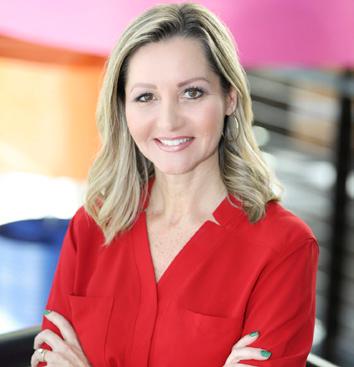
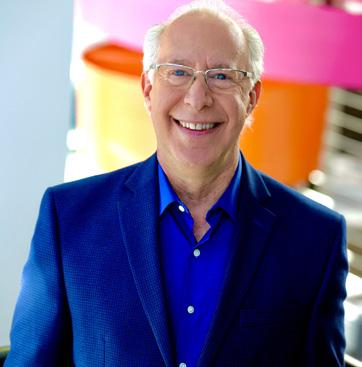






What’s Next! is a jolt of inspiration that helps audiences of all ages believe that it’s never too late to pursue their passions and make a difference in their communities.



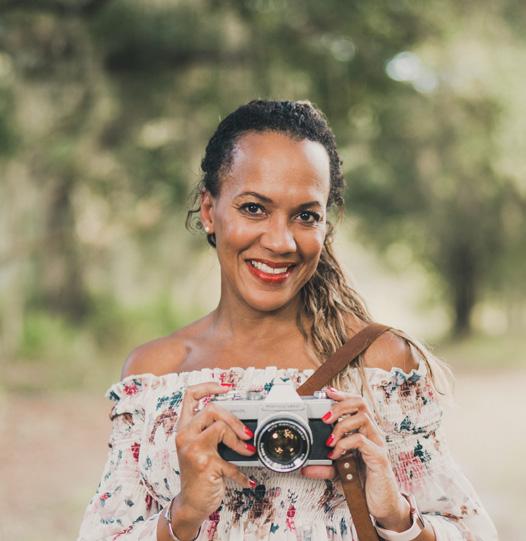

Watch all episodes at GrowingBolder.com/tv




When Bob Roth was a student at the University of California, Berkeley, this country was in chaos. The war in Vietnam, civil rights protests, and the counterculture movement left him stressed and uncertain. He gave meditation a try and was surprised to find that he liked it. He’s been doing it twice a day ever since. He became a meditation instructor, teaching people like Oprah and Lady Gaga, and thanks to his work with the David Lynch Foundation he’s also brought Transcendental Meditation to inner city kids, military veterans and victims of domestic abuse.
Now, at the age of 72, the most sought-after meditation teacher in the country wants us to know we need meditation now more than ever. Here’s why.
“If something’s wrong physically we can see the wound,” he said. “The ways stress shows is through anxiety, substance abuse and depression. You don’t need a pill to treat it; you need rest, deep rest — which you get through Transcendental Meditation.”
The big difference between the 1960s, when meditation was all the rage, and today is that there is now research to back up Roth’s claims. He told Growing Bolder a Harvard study published in Science Magazine found that twenty minutes of meditation offers the body a more effective rest than six hours of sleep.
“A good night’s sleep will drop cortisol levels by 10%,” he says. “Transcendental Meditation drops cortisol levels by 30 to 40% and nothing else does that.”
Roth believes the many changes that come from aging make meditation an important ingredient in increasing longevity.
“It’s modern life,” he explained. “As we age, we
experience enormous social, financial and health pressures to the point where PTSD isn’t just something that happens to soldiers at war. This toxic stress we all encounter raises our cortisol levels which weakens the immune system which means we’ll be sick more often. Cortisol floods the hippocampus in the brain affecting the way we think, leading to cognitive difficulties. As I pointed out, meditation can drop cortisol levels by as much as 40% and nothing else we know of does that.”
He is working now to make meditation a mainstream part of your daily life, too.
“I believe meditation will be integrated into our society through the workforce,” said Roth. “At work they’ll have meditation rooms or quiet rooms where you can take 20 minutes at the end of the day to decompress and reduce those cortisol levels before you go home to be with your family.”
Roth believes Transcendental Meditation will continue to play an increasingly important role in the quality of our health and wellbeing.

“We just have to prioritize ourselves more than we do,” he explained. “We go through life with this attitude of just grinding it out until we retire only to find that life doesn’t work that way and neither do our bodies. All it takes is 20 minutes to meditate. There’s 1,440 minutes in our day. Make the time. You’re going to be more loving with your family, you’re going to be more effective and productive at work, and you’re going to enjoy your life more. Prioritize yourself. You’ll be pleasantly surprised how just a little can go a long way.”
To learn more about transcendental meditation and how you can get started visit TM.org.
“The world has simply gotten too intense. The human nervous system was not designed to handle the degree of unrelenting pressure we experience in our lives.” – Bob Roth tells Growing BolderPhoto by Alexander Berg
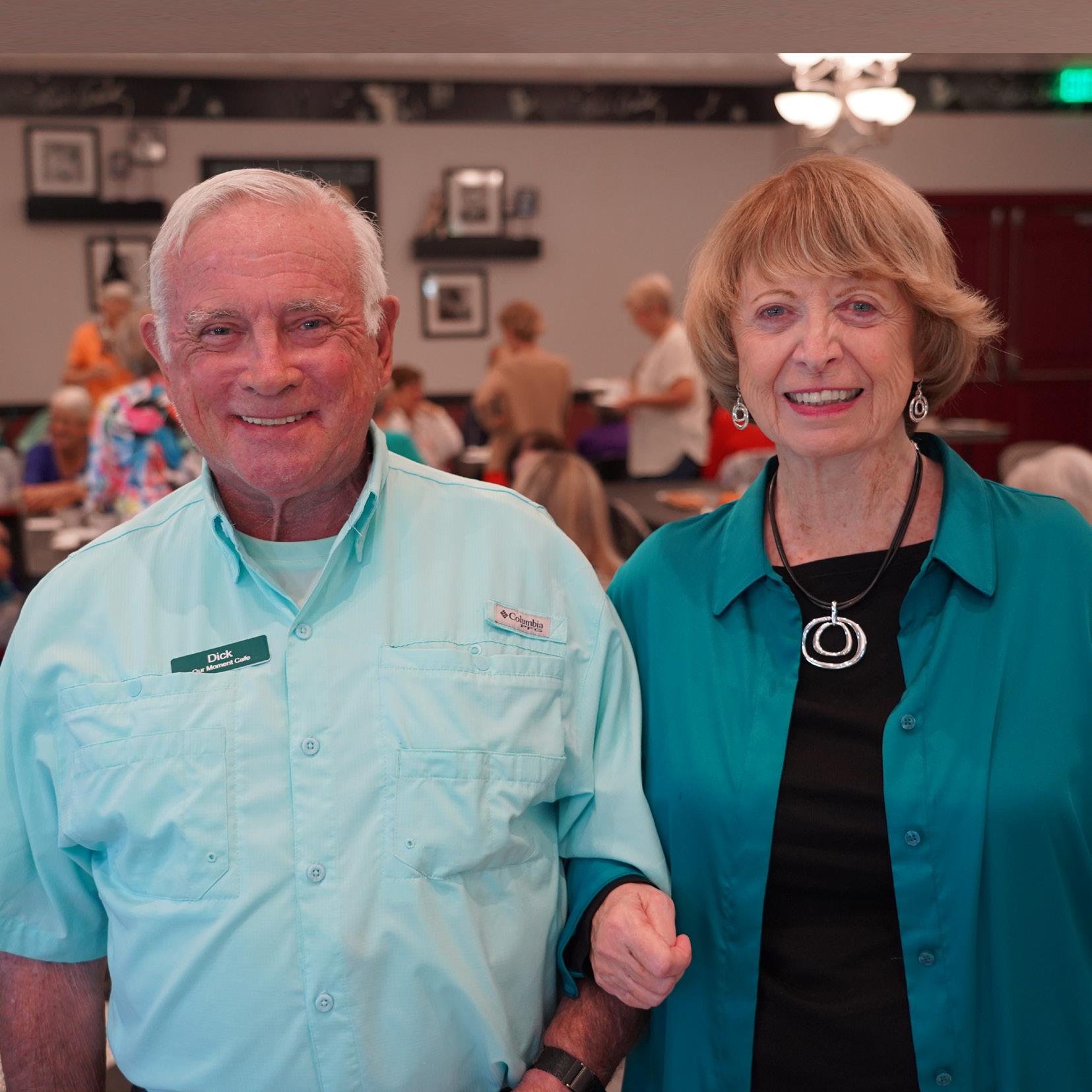
Sometimes the simplest thing — a song, a smile, a dance — can mean everything. When you have dementia, there aren’t many places to go to find those joys; and when you’re a caregiver for someone facing cognitive decline, it’s easy to feel isolated and lost.
Joan Bender and Dick Boyden looked around their community of The Villages, Florida, and saw an opportunity to combat this problem and create something revolutionary: a place for caregivers and patients to find acceptance and connection.
Named “Our Moment Cafe,” their nonprofit group organizes meeting places featuring live performances, singing, dancing, art, sports, tai chi and more, all aimed at helping those with memory impairments and their caregivers to interact and participate with one another. The need for these moments of joy and love was evident from day one.
“The phone rang off the hook for two weeks!” Boyden laughed, recalling the response to their first ad in the local paper.
“This was something that most people would never do. But we’re trained, we’re able, we’re qualified,” Bender explained. “Both of us really have a very strong faith, and part of that faith is giving back. If you are given so much, you have to give back.”
They’ve been in demand ever since, as one of few opportunities to battle the isolation and the loneliness that so often confront not just the person, but their caregiver, too.
“We provide a safe and supportive atmosphere where they can have fun, whether it’s interactive activities or just sitting down and having a cookie and talking with each other. The key here is not entertainment, it’s engagement,” Boyden explained.
“We love these people with our hearts,” Bender chimed in. “They’ll call us to talk and we ask how they are doing. Last month a woman, with tears in her eyes, came up and said ‘Thank you so much for doing this. My husband hasn’t held me in six years.’ Can you even imagine that? And they danced here. We just love what we do.”
It’s a model that this married couple thinks can be replicated to help caregivers and those they care for across the country.
“People are talking more about dementia now,” Boyden said. “And I think that’s a healthy thing because everyone is going to experience something along this line at some point in time.”
The smiles, joy and heartfelt connection flowed throughout The Villages recreation center on a beautiful fall afternoon, as dozens of couples danced and sang to a live music performance arranged by Our Moment Cafe. But perhaps the most joy in the room could be felt by 100-year-old Marguerite Bacon, who has Alzheimer’s disease, and was in attendance with her daughter, Jeanette, who is her caregiver.
“This is fun. This is living,” Marguerite said while tapping her toes along to the live music. “It’s just being out with other people. I love life!”
“She’s not fighting it,” Jeanette explained. “She’s cooperating with it and making the best of it and making the best of every day.” Marguerite immediately chimed in, “Cooperating — that’s a good word!”
Thanks to Joan, Dick, and the volunteers that make up Our Moment Cafe, people with dementia and those who stay by their side are given a chance to do what Marguerite, at 100 years old, believes we all should do.
“Oh, live each day! Live each day and enjoy!”
“Both of us really have a very strong faith, and part of that faith is giving back. If you are given so much, you have to give back.”
Take Growing Bolder with you on your next walk, run, drive, flight, or even when you’re just enjoying time around your home. The Growing Bolder Podcast is a fast-paced, entertaining hour that will leave you excited about the possibilities in your life and prove that it’s never too late to create a life filled with passion, purpose and adventure.
There is especially so much wisdom to be absorbed from the empowered females we’ve had as guests who are making a difference in their communities. Women who are exploring the world, changing sports history, starting businesses, saving the environment, conducting breakthrough research and more. Here are a few women who headlined recent podcast episodes with experiences and lessons in empowerment we can all listen and learn from:
Tracey Gendron is a nationally recognized gerontologist who believes everything you think you know about aging is wrong! She says the most important indicator as to whether your future will be one of opportunity or one of loss is your attitude. She explains the changes you can make in your outlook on life that will result in your best chance at good health and happiness in the coming years.

Subscribe to the Growing Bolder® Podcast to catch brand new episodes every week! On Apple, Spotify or wherever you access podcasts.

Meet a woman who thought she could change the haircare industry. It’s the inspiring story of Angel Cornelius and the products she invented at her kitchen table that she now sells nationwide. She’s proof that a good idea, belief in yourself, and persistence pays off.

Jillian Michaels is one of the most famous fitness trainers in the world, known for using tough love to achieve extreme results. For a decade, she was the face of the hit television show, “The Biggest Loser.” Today, she’s talking to Growing Bolder about her own personal transformation, from an overweight kid to inspiring others to change their mental outlook and gain control over their weight, their health and their lives.

From the moment Annie Griffiths picked up a camera, her sense of purpose was born. Griffiths was one of the first female photographers for National Geographic, where she’s worked for over 40 years. She’s the author of four books and the founder of Ripple Effect Images, a collective of photographers who document aid programs that are empowering women and girls in the developing world. Griffiths talks to Growing Bolder about her decades finding deep happiness and joy through visual storytelling and how she’s using her talents to make a difference.
In 1967, Kathrine Switzer became the first woman to officially register and run the Boston Marathon. Early in the race, assistant race director Jock Semple charged onto the course and tried to physically rip off her bib number and remove her from the competition because she was a woman. Switzer finished the race and found her life’s mission: to provide opportunities for women all over the world to experience the same empowerment she felt through running.


Submerge yourself in one of the most dangerous jobs there is. As one of the top underwater cave explorers in the world, Jill Heinerth has explored icebergs, volcanic lava tubes, and submerged caves. She talks to Growing Bolder about her experiences being the hands and eyes of climatologists, archeologists, and engineers, and helping them to better understand our earth.


1948 was quite a year. NASCAR was born, Babe Ruth died, and Bernice and Irving Locker were married. 74 years later, the two are as much in love as ever.
“I love everything about her,” said Irving. “Her smile, her nature, everything.”
“And I love his compassion,” added Bernice. “He cares deeply, and I love how much he gives of himself.”
Irving attended high school with Bernice’s sister. Their friendship was interrupted by World War II where Locker survived five major battles including D-Day and the Battle of the Bulge. He gained a reputation for being small in stature but huge in heart. After the war he returned home to Passaic, New Jersey. Remembering Bernice’s sister, he fixed her up on a date with his brother. The two fell in love and married. That’s also how Bernice and Irving got to know each other.
“Right away I fell in love with his mother,” laughs Bernice. “She was such a wonderful person, I had to have her in my life; so when Irving asked me to marry him, I said, ‘Absolutely!’ I guess I got lucky that he is just as wonderful as she was!”
Of all they have in common, they agree the most important thing is their outlook. “Something we both have, that we were both blessed with, is a positive attitude towards life,”
said Bernice. “We believe that whatever God throws at you, and we all get our share, that you handle it and work together to get past it.”
They understand that this is easier said than done. “We’ve gone through some very tough times,” said Irving. “We lost both our sons.”
Bernice added, “Both of them died at age 52, two years apart. And if we didn’t have each other at the time, I don’t think either of us could have gotten through it. But we did. We just focus on the fact that they left us wonderful gifts: our grandchildren and great-grandchildren. We’re very close with all of them. Can’t ask for more than that, can you?”
For Irving, life at 98 is both full and fulfilling. He speaks before church and school groups about his many experiences in World War II and he is active with charitable groups in raising funds for disabled veterans near his home in The Villages, Florida. But just as often, people ask him about love, relationships and life.
“So many people argue over the little things,” he said. “And it doesn’t mean anything. Then little things become big and out of control. That is what destroys relationships. Just let it go. Don’t sweat the small stuff, do you hear me? Don’t sweat the small stuff.”
And yes, Irving practices what he preaches.
“If we disagree, it’s instantaneous,” added Bernice. “It’s like it never happened. It doesn’t mean that we don’t have differences. But argue? Raise your voice? Never.”
Irving insists it was a mindset that was instilled upon him at a very early age. “I was raised dirt poor money wise, but very rich in loving goodness,” said Irving. “My parents taught us that no matter what, you take care of others, something I’ve always believed in and have always tried to do.”
Perhaps it is why, even though the Lockers are in the twilight of their lives, they insist each day is just as cherished as any other.
“Every morning I thank God for another day and for all the blessings in our lives,” said Bernice. “And every now and then I’ll ask, ‘You've kept us here all these years — give me a clue. What are we supposed to be doing?’ When I mention that to our friends, they say, ‘You guys are an inspiration. That’s why you’re here.’ If we can be that, if we can inspire people to stay married, be happy and love each other, then I think that’s a good reason for us to be here.”
“You can’t imagine how good our life is,” added Irving. “We’re very happy to be alive and well, and we’re determined to make the most out of every day we get.”
“... ‘You guys are an inspiration. That's why you're here.’ If we can be that, if we can inspire people to stay married, be happy and love each other, then I think that's a good reason for us to be here.”
BERNICE LOCKERPhoto by Mike Dunn for Growing Bolder

"I would like to be remembered as someone who used whatever talent she had to do her work to the very best of her ability."
–Ruth Bader Ginsburg
Flo Meiler is an 88-year-old great-grandmother and arguably the greatest all-around female athlete over the age of 85 that has ever lived. She’s also a pole vaulter, high jumper, hurdler, hammer thrower, long jumper, javelin thrower, steeplechaser, sprinter, and distance runner. She’s nearly unbeatable in her age group and has 35 world records to prove it.
Flo grew up on a dairy farm in Champlain, New York and was always active, if not athletic. She participated in basketball, cheerleading, tap dancing, drama club, and glee club in high school. As an adult, she was an avid tennis player and competitive water skier but never even thought about track and field until she was 60. “My friend, Barbara Jordan, pleaded with me to join the masters track team and compete in the Vermont State Senior Games with her,” she says. “I had no idea that it would change my life.”
The long jump was her first event and the others soon followed. She tried pole vaulting for the first time at age 65. Today, she’s the oldest competitive female pole vaulter in the world and holds the age group world record. “I can’t believe I’m pole vaulting at 88,” she says. “It requires speed, strength, and technique. I love to challenge myself and pole vaulting is the ultimate challenge.”

Flo is proud of her success and wants others to know that it hasn’t come easily. She works out six days a week alternating between days at the track and days in the gym. She usually works out alone but has a coach to help her with technique in the more technical events like javelin, high jump, and pole vault. “It’s not easy but it’s possible for just about anyone,” she says. “I tell everyone, ‘You can do this. You can do whatever you set your mind to, but you must start slow. You have to warm up properly and stretch, stretch, stretch!’”
2022 was an especially good year for Flo. USA Track and Field named her the overall Masters Athlete of the Year, beating out thousands of other competitors, male and female, from age 35 to over 100. All told, she won 18 national titles in 2022 — 8 indoors and 10 outdoors and set multiple American and world records.
Unfortunately, Flo is the exception when it comes to being active. Most 80 year olds get zero physical activity. In fact, 25% of all American adults get no exercise whatsoever. It’s not a coincidence that the number of frail older adults is projected to double by 2040. As we get older, we naturally lose some strength and power and, if we don’t exercise, we lose so much that basic tasks become difficult. When that happens, we become even less active. When we become less active, we become less fit. And when we become less fit, we become far more susceptible to a never-ending series of health issues. It’s a costly, life-stealing cycle of decline.
Flo Meiler and the ever-increasing number of older athletes prove that we don’t have to decline to the extent that we’ve been led to believe is inevitable and unavoidable. We can remain active and vibrant into our 80s, 90s, and even 100s, if we engage in regular physical exercise. “You have to push yourself,” Meiler said. “I love to compete, win, and set records; but what I love the most is motivating others to get off the couch. I want to do anything I can to influence people to exercise. I want to be an inspiration.”
This is a tried and true savory recipe with lamb that falls off the bone, and a delightful sauce made with wine and a vegetable bouquet. It takes about 3 ½ hours to cook in the oven, so this is a great dish to make ahead and eat the next day.

Serve it with either couscous or pasta, and in season vegetables.
Classically trained chef George Vogelbacher, 81, was a Garde manger and pastry chef for the Watergate Hotel in the 1960s. He made several trips to the White House, including one to assemble Lynda Bird Johnson’s wedding cake. Vogelbacher moved to Central Florida in 1968 and has been creating culinary delights for residents ever since, for 30 years at the famous Le Cordon Bleu restaurant, and currently at Maxine's on Shine
 Chef George Vogelbacher
Photos by Mike Dunn for Growing Bolder
Chef George Vogelbacher
Photos by Mike Dunn for Growing Bolder
RECIPE
Lamb Shank Glazed in Demi-Glace
Serves 2 people
(2) 12-14 oz lamb shanks

1 quart of demi-glace
Salt
Pepper
Dry red wine of choice
Oil of choice
½ oz shallot finely chopped
½ oz garlic finely chopped
3 oz diced onion
3 oz diced carrot
3 oz diced celery
3 oz diced red pepper
1. Pre-heat oven to 350 degrees
2. Season lamb shanks with salt and pepper.
3. Place in a pre-heated frying pan with oil of choice (olive oil preferred)
4. Sear all sides of lamb shank till brown. (May need tongs to hold lamb shank in position when browning.)
5. After lamb shanks are browned, place in a large deep cast iron pan on stove top on low heat.
6. Cover lamb shanks half-way with dry red wine of choice (it pairs well with Chianti). Continuously, rotate lamb shanks till the wine has reduced by 50% and all alcohol is burned.
7. Add the following: Shallot, garlic, onion, carrots, celery, red pepper.
8. Cover completely with demi-glace and bring to quick boil.
9. Cover with aluminum foil and bake at 350 degrees for about 3-3.5 hours or till meat falls off bone.
10. Serve with pasta or couscous.
When Alice Tym arrived at the University of Florida as a freshman in 1960, there was no women’s tennis team. So, she started one. She was the head coach and played numberone singles for four straight years. A feat amplified by the fact she’d only first tried the sport in high school.
“I grew up in Peoria, Illinois. I was playing baseball — not softball, but baseball — and my father wanted me to do something that was more respectable for a young girl,” Tym explained.
Wilson Sporting Goods sponsored a clinic at a local park, with 1953 Grand Slam champion Maureen Connolly as the instructor. Tym went and was hooked. “I just knew that that’s what I wanted to be — just like her. That was the beginning, and I never looked back. I’ve played tennis ever since, or another racket sport.”
Following her college career, Tym joined the international tennis circuit, playing all four Grand Slam events and in tournaments all over the world, earning a world ranking as high as number 13 in 1969.
“What is the chance that somebody from Peoria, Illinois would have to travel all over the world? Meet kings and queens, have just incredible experiences,” Tym reflected. “New Zealand, Australia, India — these places were fantastic. There wasn’t a separate women’s tour and a separate men’s tour. We were all together. It was so much fun because every night was a party. I didn’t play for any other reason than it was really fun. And it can still be fun.”
After starting a family, Tym began a hall-of-fame collegiate coaching career. She started the women’s tennis team at the University of Tennessee at Chattanooga, where her teams won two national championships in her four seasons as head coach. From there Tym moved to the Ivy League, coaching the Yale University women’s team to two conference championships. In 1983 the International Tennis Hall of Fame named Tym its Tennis Educational Merit Award winner, and in 2008 she was inducted into the Intercollegiate Tennis Association Women’s Hall of Fame.
Tym earned a master’s degree in geography from the University of Florida in 1966, and in 1982 she returned to the University of Tennessee at Chattanooga to join the geography faculty. But just because Tym stopped playing and coaching tennis, didn’t mean she was done competing.
She transferred her skills to other racket sports, like badminton, pickleball, and table tennis, quickly excelling. Tym has earned multiple world and national championships. She brought home four gold medals and a bronze from the 2022 National Senior Games, and won two gold medals in the 2022 Margaritaville USA Pickleball National Championships.
What keeps Alice Tym trying new sports and competing at 80? Is she genetically blessed or a freak of nature?
“No! Just quit bitching and do something. Get out there and do it,” Tym said. “Table tennis is really difficult, it's really challenging, but every day you can see yourself get better. Whereas tennis, you go downhill. I mean there's not a lot of 80-year-olds playing Wimbledon.
“So, you can learn a new sport or learn to throw the javelin, for example. All the techniques that are involved in that are just as challenging at 80 as tennis was back when I was 17.”
Now it’s pickleball that takes Tym to Spain, Germany, and Italy. A lifelong environmentalist, she builds in trips to national parks around pickleball tournaments in the U.S. “Really in many ways, the sport is secondary to the opportunity to see the country, and that’s been true all over the world. I’ve been an environmentalist since I could walk, and everybody should be because it’s something we all share.”
It’s that engagement and agency in her life that keeps Alice Tym looking forward, guided by an inner compass pointed toward fun.
“I'm not one of those people who plays for health benefits or exercise. I just play because it’s fun. And it’s always been fun,” Tym said.
“The tournaments aren’t the same, but (in a way) they can be. We still laugh. We still have a tremendous amount of fun. We have a carload of people going down to Orlando to the nudist tournament. It’ll be fun. 80 is only relative to fun. Maybe we shouldn’t measure it in years, we should measure it in laughs.
“What is the misquote — that our fate is in our stars? It’s not in our stars, it’s in ourselves,” she said. “I don’t want to say age doesn’t matter, but you make the decision whether you want to be happy at 80 or happy at 20.”

Just quit
and do something. Get out there and do it!
FOR MORE DAILY MEMES: @GrowingBolder
 Photo by Scott Eells / Stringer via Getty Images
Photo by Scott Eells / Stringer via Getty Images
"I love to see a young girl go out and grab the world by the lapels. Life's a bitch. You've got to go out and kick ass."
– Maya Angelou
The emotional toll when we lose a parent is often overwhelming and debilitating. In the midst of grief, the last thing a family wants to add on their plate is the stress and headache that comes along with cleaning out their parent’s home. Sorting through a mix of clutter and keepsakes can become both a sentimental, winding trip down memory lane, and a difficult debate of what to keep and what to sell or donate.
Instead of facing these tough times alone, families entering a time of transition can now add an allencompassing team on their side to relieve these burdens.
Caring Transitions is the nation’s largest and most trusted total-solutions provider for those needing compassionate care during life’s challenging transitions. With franchises located across the country, they are experts in relocation, downsizing and right-sizing, estate sales and online auctions, and home clean-outs.
Ted and Suzanne Austin are the local owners of Caring Transitions Twin Cities Central. Since 2021, this married couple has been changing lives in Minnesota, providing a much needed one-stop shop, and forming relationships within their community.
“It’s really like moving mountains for people,” Suzanne explained. “They just couldn’t see the light at the end of the tunnel. They couldn’t imagine their way out of their situation and then we do it.”
“We like helping people, and we’ve seen monumental impacts,” added Ted.
“We had one client who had just lost her job. Her brother had been diagnosed with cancer. Her father had to relocate to a memory care facility, and her mother had just passed away,” Suzanne explained.
While these challenges began to pile up, the mounting pile of clutter at her parents’ old home loomed large. The Austins took on the task and began cleaning out the house, while helping to identify old belongings to sell on Caring Transition’s online auction, CTBIDS, to offset costs.
As the clean-out progressed, the family alerted the Austins to a special request: despite looking everywhere throughout the entire house, no one had been able to locate their late mother’s wedding ring.
After several days of excavating through the property, a Caring Transitions team member called Suzanne.
“He said, ‘You’re not going to believe this, but I just found the wedding ring.’ It was found inside a tool bin, in the shed next to the garage. Probably in their safe space,” Suzanne recalled.
The Austins were eager to deliver the news to their client and picked up the phone to announce the treasure had been recovered.
“She immediately burst into tears,” Suzanne recalled. “She told us that date, the moment we called her, was the one-year anniversary of her mother’s death. She had just been processing the day alone, processing not having her mother. To find such a treasure, that still gives us chills. It was amazing.”
For some, it may not be a wedding ring. Yet, most will search for family heirlooms that are cherished not for their value, but for the memories and emotions they hold.

No matter what transition your family is facing, you don’t have to go it alone. There are more than 280 Caring Transitions locations across the country that have the knowledge, experience and compassion to understand how delicate these times can be and to help create a way for you to move forward.
To learn more, visit caringtransitions.com
For many, making friends seemed a lot easier when we were kids than it is now in adulthood. Why is it that as we age, the art of making and keeping close friends becomes so difficult?
Dr. Marisa Franco, a psychologist and professor, wrote a bestselling book that addresses this very question, entitled Platonic: How the Science of Attachment Can Help You Make-and Keep-Friends. In an interview for the Growing Bolder podcast, she shared advice on improving our social abilities.
1 2 3
“Don't assume it happens organically,” Dr. Franco explained. “It did when we were kids because we saw each other every day and we were vulnerable, and that creates organic connection. We don't have that as adults. That infrastructure's not there. You can't just rely on things happening organically.”
“Assume that people like you. When researchers told people to assume this, they became warmer, friendlier, and more open — even though this was actually a lie — when they went in to interact with a group, and it was a self-fulfilling prophecy.”
“Join something that is repeated over time, because you capitalize on something called the ‘mere exposure effect.’ Our unconscious tendency to like people that are familiar,” Dr. Franco explained.
“Once you join that repeated group, maybe it's a hobby that you do in community with others, generate exclusivity by asking people to hang out one-on-one before or after the group.”
By following these three keys, Dr. Franco believes the important challenge of making adult friendships can become easier for all of us and create opportunities to change our lives for the better. In addition to her suggestions of practices to adopt, she also offered advice on the pitfalls to avoid.
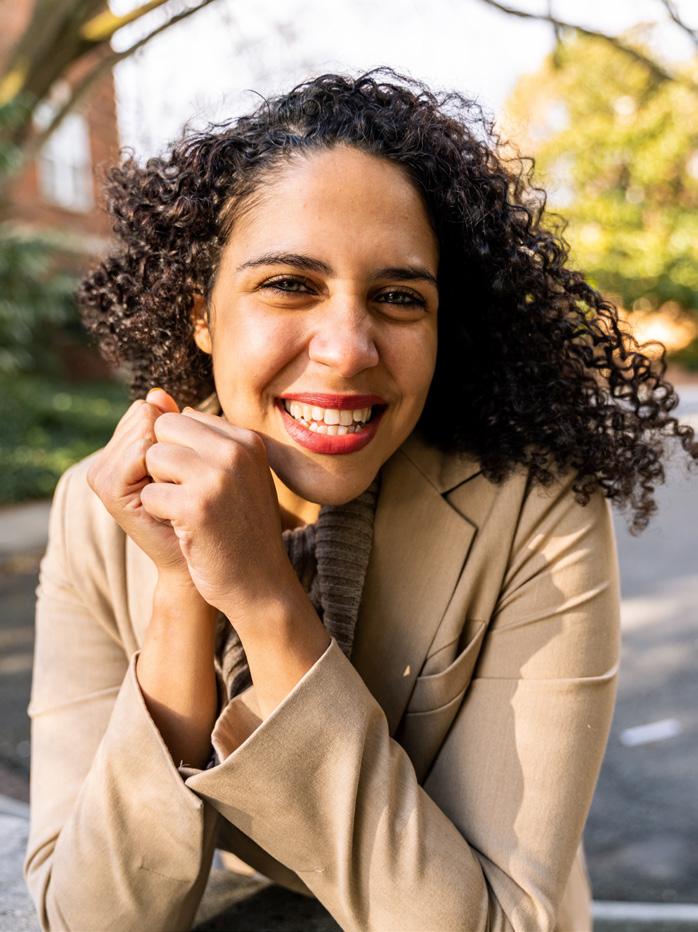
“I used to think I can make friends if I come off as smart, insightful, funny, persuasive, entertaining. But in fact, this is the least valuable quality people report in their friendships,” Dr. Franco said. “The most valuable quality is people want to be around someone who makes them feel like they matter. Being good at friendships is less about who you are, and more about how you treat people.”
Dr. Franco revealed that many times our own self-doubts likely get in the way of focusing on others in the right ways. We can get caught up in how people are treating us, if they are reaching out to us and how they make us feel, and neglect holding ourselves accountable for how we are treating others.
“For me in college, going into a social group, I would just be like, ‘Everybody's clingy, nobody introduced themselves to me, I feel lonely.’ But did I introduce myself to anyone else? Did I make anyone else feel like they belong? I didn't.
“That's our egocentric bias. We think so much more about how people affect us and so much less about how we're affecting people. To be a good friend, we need to think more about how we're affecting people and whether we are making them feel loved and valued.”
While it can be intimidating to open ourselves up to others, Dr. Franco pointed to research that shows just how crucial adult friendships are to our overall health and wellbeing.
Dr. Franco calls loneliness “one of the biggest predictors of mortality,” even more so than diet and exercise. Research shows that diet and exercise have a 20% to 30% impact on how long we live, while social connection affects our longevity by 40% to 45%. That means one of the best things we could do for our health is really to stay socially connected.
“I call loneliness, not just a state of mind, but a way of viewing the world. You actually report liking other people less, having less compassion for humanity. You focus less on others in social interactions and more on yourself, because you get into this really self-protective place. Your body's working on overdrive, because you're in a state of threat for a prolonged period of time that promotes a lot of wear and tear on your body.”
By making and keeping adult friends, Dr. Franco believes that not only will the quantity of years you have left expand, but the quality of those years will grow too.
To listen to our entire interview with Dr. Franco on the Growing Bolder Podcast, visit GrowingBolder.com

We all know stress is bad, but it may be worse than ever. According to the American Psychological Association, stress is causing a national mental health crisis that could yield serious health and social consequences for years to come. Renowned psychologist Elissa Epel is an expert on stress. Her book, The Stress Prescription: Seven Days to More Joy and Ease, is designed to increase understanding of the severity of the issue.
“We don’t take our mental health seriously until it gets to the point where problems are far more difficult to mitigate,” she said. “We have annual checkups for our physical health, why not mental health checkups, too?”
Epel argues that at no time in human history has stress been as pervasive as it is today. “Thanks to the media we have front-row seats in witnessing traumas all over the world,” she said. “We’re more isolated and alone. We feel we’re not good enough and this toxicity creates a state of chronic stress.”
Yet Epel is optimistic and believes there are ways to mitigate its effects. “First, we simply need to acknowledge it,” she said. “It reduces the stigma, making it less of a forbidden topic. Next, we need role models and social influencers like Growing Bolder that keep the topic in the forefront and change our negative mindset. These things help us have an adaptive stress response in the form of a big rush of adrenalin and a quick recovery.”
She likens the approach to choosing whether you approach stressors in your life by deciding whether you look at things from the point of view of the lion or its prey. Both feel stress, but the lion is intentional, confident, and forward thinking. Its prey senses catastrophe causing a high cortisol, vasoconstrictive response, which is difficult to recover from.
“This is where exercise and activity are a tremendous help,” said Epel. “We can take a brisk walk, do pushups, or best of all, high-intensity interval training. Exercise helps tone up the nervous system and metabolizes the stress response so that we process and recover from it.”
But these are ways of dealing with the symptoms. Epel says it is more effective to handle stress before the body reacts to it and causes chronic anxiety and depression. “New strategies, surprising ones, are now coming to the forefront,” she said. “Gratitude is a big one. Kindness to others makes a difference and so does self-compassion. These create a sense of strength and wellness that is incongruent with stress, and the body has a hard time feeling both, so whichever is stronger wins out. It is a whole new strategy that is showing a great deal of promise.”
Surprisingly, this is an area where age offers an advantage. “The data shows that with age we become more resilient; we have lower stress and lower depression. Surveys show that 60% of women in this country feel overwhelming stress while only 9% of women over 65 do. Aging helps us let go of small distractions to prioritize things like helping others, making a difference and being with people. It’s a truly beautiful benefit to aging, and one that younger age groups could really learn from.”
of women feel overwhelming stress.
of women over the age of 65 do.
“We're way out of line as a society. More than half the population feels overwhelmed by stress. We need to take this seriously as a medical disorder.”ELISSA EPEL, PH.D.
In the early days of the Internet, it took a good bit of technical know-how to leverage its potential power. When it came to distributing content, the gatekeepers were technically gone, but it wasn’t until consumer-friendly software and powerful apps were readily available that the ability to create and share content was democratized.
Understandably, the early adopters were digital natives; teens and young adults who grew up using social media platforms for communication and personal expression. The trendsetters among this group developed followers who looked to them for inspiration and advice and the age of the influencer was born.
The influencer marketing industry quickly followed when brands recognized the ability of these trendsetters to impact the purchasing decisions of their followers and began collaborating with them to promote their products and services.
Over time, social media became more widely adopted by older adults and today the fastest growing demographic on almost every social
media platform consists of adults over the age of 50. This led to the rise of “silver influencers” or “granfluencers.”
Some granfluencers are little more than puppets for younger creators looking for laughs and followers with content that only serves to reinforce the negative stereotypes of aging. In their hands, older adults are presented as bumbling buffoons trying to act like teenagers.
At the opposite end of the older influencer spectrum are those who espouse personal growth and self-love. They present an authentic, inspiring, and valuable look at aging by sharing life experiences in every way imaginable including health, fitness, fashion, beauty, cooking, gardening, travel, and more. They’re transforming lives by demonstrating that more is possible than our ageist culture has led us to believe.
At Growing Bolder we call this “the someone like me effect.” When we can see ourselves in others, when we can see someone doing something that we want to do but didn’t think we could do, our belief system about what’s possible
changes. When our belief system changes, our life can change.
Not surprisingly, the most successful older influencers are women who are paving the way for self-acceptance and happy and healthy aging with a message that appeals to people of all ages. They’re redefining age and the experiences it can bring. And many are now being rewarded financially. Those with large followings are paid anywhere from $50 to tens of thousands of dollars for a single post through sponsored content and brand deals. And many don’t stop with a YouTube channel, Instagram, or TikTok page. They’re launching websites and podcasts, writing books, and setting up online stores and earning affiliate fees for selling the products they hype.
Twenty years ago, you needed to own a production company and a newspaper or television and radio network to reach a broad audience. Today you only need a smartphone, an internet connection, and a message that resonates to make a living for yourself and make a difference in the lives of others. Here’s to the new, older Women of Influence.
@cookingwithlynja
15.1M TikTok Followers
Lynn Yamada "Lynja" Davis, is a retired MIT engineer who was quarantined with her husband and son, Tim, during the pandemic. Tim, a freelance videographer and editor, challenged the family to make 30 short videos in 30 days to keep his creative and technical skills sharp. He made videos of Lynja and her husband playing with the dog, mowing the lawn, and filling the birdfeeder. He shot a few cooking segments with Lynja who turned out to be a natural on camera.
Lynja’s sense of humor combined with Tim’s editing style: quick cuts, sound effects, pop culture references and comedic visual choices resulted in unconventional cooking videos. After a slow start Cooking with Lynja took off when her 29-second breakfast sandwich tutorial went viral on TikTok. “Tim called me and said, ‘Mom, we have 300,000 views.’ I thought he was joking. Why would anybody watch a bacon, egg, and cheese video?” Collectively, Cooking with Lynja videos have more than 3 billion views to date, and she has over 15 million followers on TikTok alone.

“I’m just a regular mom with killer cooking skills!”
@ElisaBerriniGomez 286K TikTok Followers
Elisa Berrini GÓmez describes herself as a radical self-acceptance activist. A bilingual Latina, she uses her signature long, grey hair to stimulate conversations in two languages around aging, mindset, and positivity.
GÓmez encourages women of all ages to disregard the judgement of others and reject our cultures unrealistic standards of beauty. “I am not a fashion stylist, makeup artist, nor hair stylist. I don’t pretend to be an expert in any of these areas. However, when it comes to styling, I do ‘me’ and if my ‘me’ prompts ideas to others, my work is done. My kind of woman is one who is not afraid to admit that she has gained weight, no longer has the same strength, accepts her wrinkles and, of course, her grey hair.”

“I tried dressing my age, and I look dead. You don't dress your age, you dress your energy. ”
Babette Davis is a Los Angeles-based vegan chef, fitness enthusiast, actress, activist, and health crusader. She loves the camera, and the camera loves her. Her videos are filled with infectious energy and inspiration to eat better and never stop moving.

Babette endured a challenging childhood that led to an addiction to drugs and processed foods. Battling numerous serious health issues, she made the personal commitment to lifestyle change and totally transformed her life.
Babette not only proves that it’s never too late to turn it all around; but she also shows, by example, how to do it.
“What I’ve gained more than anything is appreciation for the incredible, human body. Part of self-loving is moving and being able to move. I don’t want to get in the bathtub and have to call the fire department to get me out. Can I please tie my own shoes when I’m 90?”
Heidi Clements describes herself as a “writer/wearer of clothes.”
She’s a longtime blogger, a former producer for Entertainment Tonight and executive producer on the ABC sitcom “Baby Daddy.”
A tattooed former alcoholic, Heidi says she is now addicted to

“good shoes and bad cake.” She lives in Los Angeles with “three dogs, debt, and the judgment of others.”
What is the WelcomeToHeidi TikTok channel about? The obvious answer is that it’s about Heidi trying on everything in her closet and parading in front of her camera. The
introduction to her book by the same name offers a much better description.
“Take a trip inside the mind of a sarcastic, dysmorphic, slightly mental, completely fashion addicted, single woman who’s trying to live the second half of her life with zero apologies and massive debt.”
“Sex is not the gateway to kindness. Your penis is not the hug I need at the end of the day. I don't need your penis. I need you to stop doing shit that makes me act like a bitch.”
@welcometoHeidi 305K TikTok Followers
Gail Rudnick discusses the generational differences of dating, sex, and relationships with her 26-year-old granddaughter, Kim. Grandma Gail offers advice for younger generations based upon her decades of life experience. It all started when Gail and Kim moved in together during the pandemic and Kim began asking for dating advice. They soon realized that the generations have a lot to learn from each other and their podcast was born.
Like many channels involving older influencers and creators, Grandma Gail’s online presence and success is facilitated by a younger relative. In this case, granddaughter Kim, who has a background in streaming media production, marketing, and distribution. The two now have an Excuse My Grandma podcast, website, online store with branded merchandise and popular social media channels on TikTok, Instagram, YouTube, and Facebook.

“Don’t be afraid to eat dinner or see a movie by yourself. Actually, I prefer it.”

“You know the idea that no matter how bad things seem, there’s always someone out there who has it worse? I’m that someone.”
LISE DEGUIRE
Lise Deguire knows pain, suffering, and loneliness. She also knows courage, gratitude and resilience.
Deguire was four years old when when the family barbecue caught on fire. Her mother ran to safety, leaving Lise alone, blocked by a wall of flame. Her father saved her, but not before third-degree burns covered her arms and torso. Her face was most severely damaged as burns devoured her lips, chin and neck. Her life would never be the same.
Her existence became an endless stream of surgeries and a new identity as someone grotesquely disfigured, who was bullied, mocked, teased, rejected and heartbroken.
But as much as her story is about suffering, it is even more about resilience and gratitude.
“When you’re burned and you look different, only certain people are attracted to you,” said Deguire. “But they tend to be incredibly kind, quality people. I attribute a lot of my surviving and thriving to the many who stepped in to help.”
She became determined to use what she had learned through her difficult journey to help others. Deguire became a clinical psychologist and authored a book about her experiences.
“My book, Flashback Girl: Lessons on Resilience from a Burn Survivor is very much about being the most unfortunate person you’ve ever seen,” she said. “And how I went from that to having an incredibly blessed, fulfilled life. It took 50 years, but I did it, and I’m here to tell you that you can do it, too.”

Not only does she use herself as an example, but she has
also done extensive research to try to understand how we can better face our challenges by becoming more resilient.
“Science explains resilience as mostly a mindset - one we can learn,” said Deguire. “One way is by embracing gratitude, which might seem superficial, but it turns out that gratitude literally changes our brain chemistry and can help us endure almost anything.”
Deguire believes it becomes an even more important factor as people age.
“When you get older it is important to focus on what you have as opposed to what you’ve lost,” said Deguire. “This gets back to gratitude. Be grateful for family and friends. Prioritize making new friends, too. Connecting with others of all ages is very important. Also, indulge your interests, dive into your hobbies, follow your curiosity to discover new things. No matter what we face, if we do it with an attitude of gratitude, and embrace life instead of mourning it, even the most difficult situations can be fulfilling.”
Deguire understands that we all face challenges, some traumatic and tragic. Her message is that even in the depths of despair there is always a way forward.
“The point is, never count yourself out,” she said. “People tell me they could never survive being disfigured, but the truth is, if that’s your life, you will find a way. Not only am I a psychologist, but I’ve also been in therapy many times, which has helped me tremendously. Help is out there, and it works. I urge anyone who feels like they’re really floundering to please seek it, because I bet you can get out of it. That’s my story. There is hope.”
When Zoe Long was born with Down syndrome, her parents knew she would need extra help, with day-to-day activities and to live a full life. Her mother, Sara, found a solution when she learned about hippotherapy: physical, occupational, and speech therapy that utilizes the natural gait and movement of a horse to provide motor, and sensory input. Used mainly for patients with physical and mental disorders, the goal of hippotherapy is to improve neurologic functions and sensory processes. Zoe started when she was just 3 years old.
“It was a little nerve-wracking at first because of the worry about her being on such a big animal,” Sara Long said. “But once she got on the horse and I saw the benefits that the hippotherapy gave to her, it was worth it. The volunteers are there helping her, leading the horse. It just seemed safe and felt good. I wanted her to have that experience.
“It makes me happy too,” Long added. “You see my smile as I watch her, and I just feel pride and love that she has the opportunity to have that happiness and joy in her life.”
For 40 years, the Marion Therapeutic Riding Association (MTRA) in Ocala, FL has been helping individuals like Zoe through therapeutic horseback riding and equine assisted learning activities. In addition to helping adults and children with physical and intellectual delay, class attendees include stroke survivors, people with multiple sclerosis, and veterans with post-traumatic stress disorder.
Sally Lyle, 80, started at MTRA as a volunteer. After nine years the lifelong equestrian decided she could be an instructor and became certified in equine therapy. That was 27 years ago. The magic of the connection she experiences between horse and rider keeps her coming back.
“With Zoe, that horse loves her and has given her confidence,” Lyle said. “If they're physically unable, it gives them a physical ability they don't have. If they're mentally unable, it gives one calm and confidence. There's something about that big beast that just wants to take care of you.”
MTRA Executive Director Pam Morrison also sees the
difference the horse-rider connection makes, no matter the person’s life condition or experience.
“I see a person who was probably told that they would never amount to anything, that they weren't smart enough to do this or they weren't physically able to do that and really just told they didn't have possibilities,” Morrison said. “I see them come in here and their whole persona changes to ‘I can do. I am important. I can contribute. I am achieving, and I am reaching my goals and my possibilities.’”
MTRA helps empower over 160 people a week. They are accredited by Path International, the organization that governs therapeutic riding services throughout the world, requiring continued education and certifications in the field.
Volunteers make MTRA go, contributing in a multitude of ways beyond the actual therapy, from office work and animal care to making lunches, maintaining the 35 acres and spending time with the families. Knowing the impact of what they do is the reward.
“I have a veteran who told me that he had a gun to his head the day before he came here,” Morrison shared. “He debated about coming and his wife begged him. He said, ‘This place is saving my life. It's saving my life.’”
“I had a young man that came to us with autism, would not speak,” said Lyle. “I paired him with the right horse; it was dumb luck, but he started saying what he was thinking, but saying the horse was thinking it. He said, ‘Solo is not having a really good day today. He might not do very well.’ Within six months, his parents said nobody in the family recognized him, that they couldn't shut him up. He tells jokes and they're funny.
“I never leave here feeling bad, ever,” Lyle added. “This is as good for me as it is for anybody else here.”
“Those stories are just endless,” said Morrison. “There's all kinds of wonderful little miracles that happen all the time and we're just privileged to be here to experience them.”
To learn more about MTRA services or volunteer activities, visit mtraocala.org
“I see a person who was probably told that they would never amount to anything, that they weren't smart enough to do this or they weren't physically able to do it... I see them come in here and their whole persona changes to
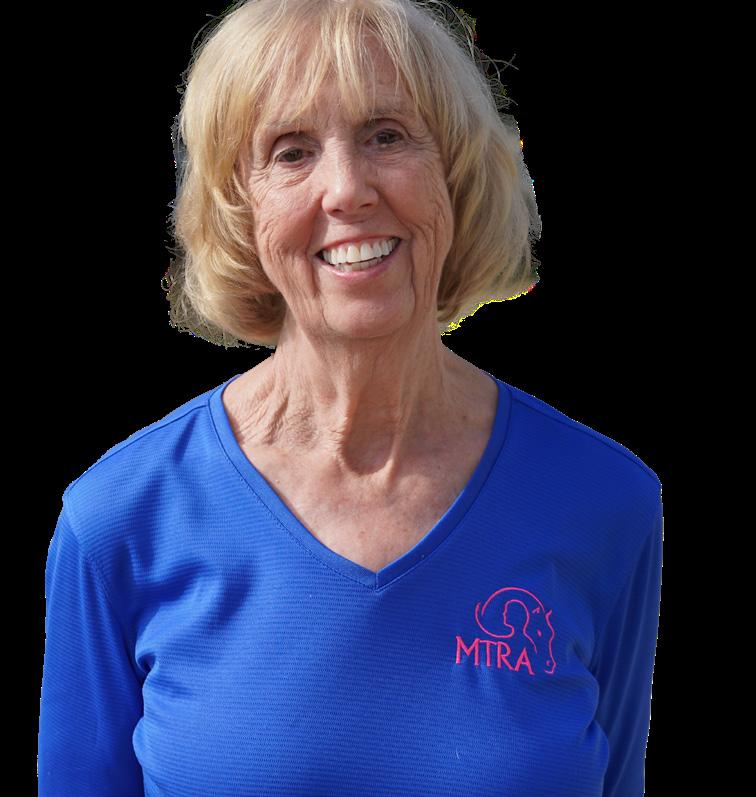
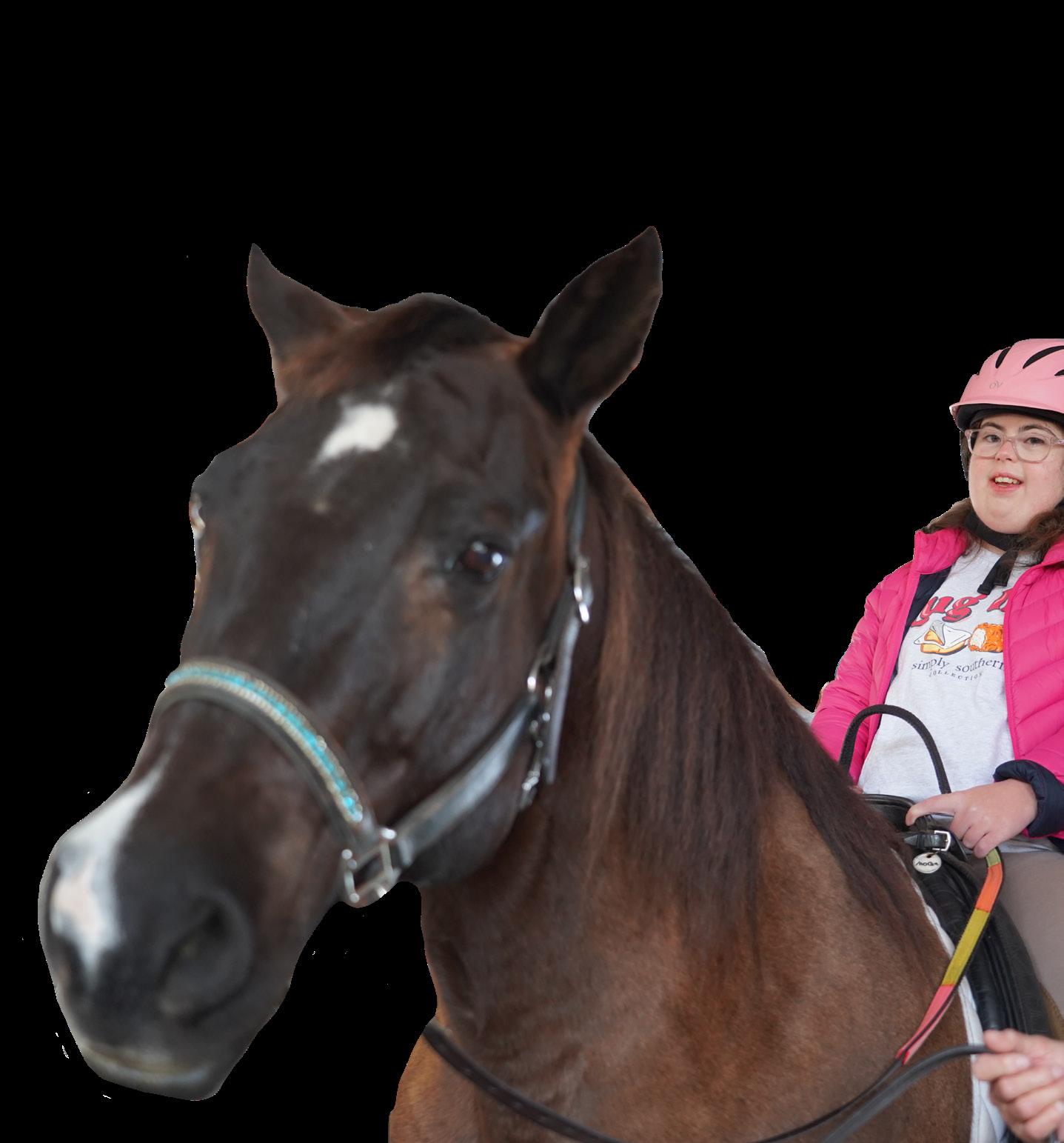

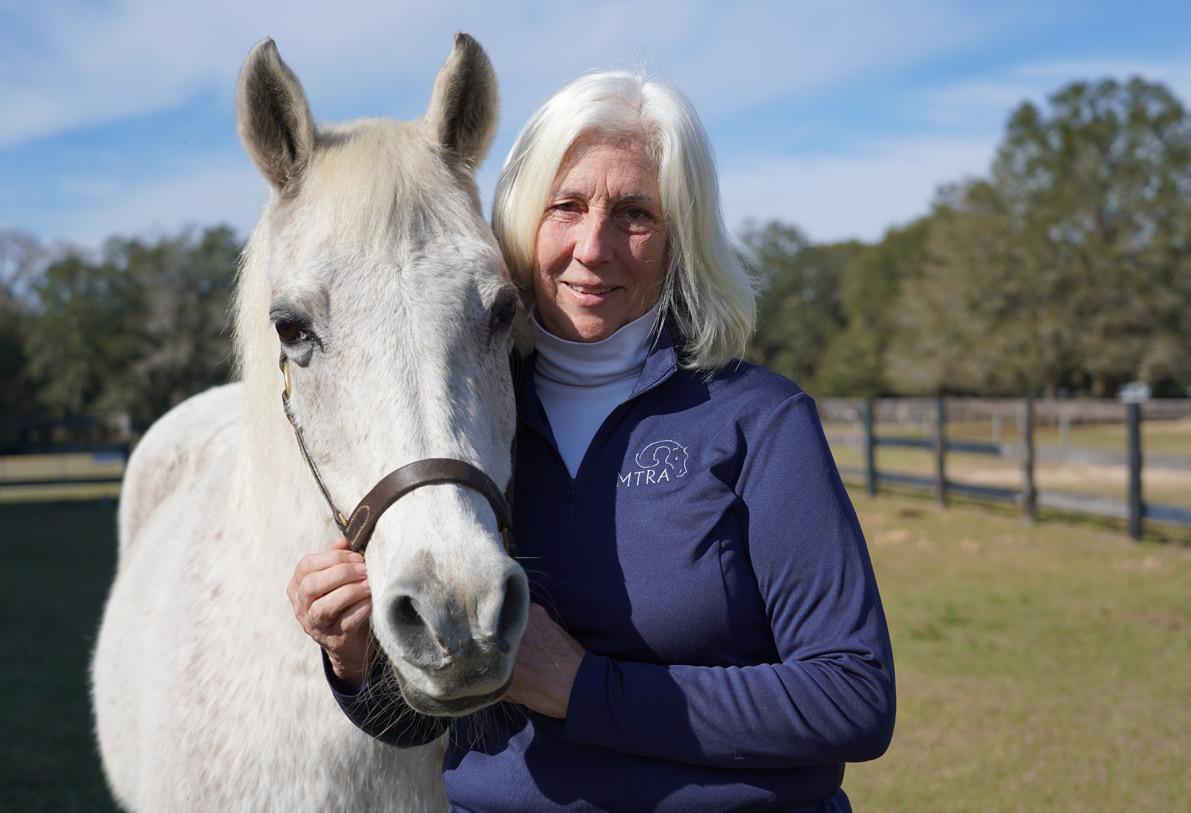

“With Zoe, that horse loves her and has given her confidence. If they're physically unable, it gives them a physical ability they don't have. If they're mentally unable, it gives one calm and confidence. There's something about that big beast that just wants to take care of you.”
‘I can do. I am important. I can contribute. I am achieving, and I am reaching my goals and my possibilities.’”
SALLY LYLE Certified in Equine Therapy
PAM MORRISON MTRA Executive Director
Vanessa J. Skinner is a shareholder with the firm of Winderweedle, Haines, Ward & Woodman, P.A., where she chairs the firm’s Wills, Trusts & Estates Department. She was recently named one of the Best Lawyers in America in the area of Elder Law for the third consecutive year. She is the host of The Power of Planning Podcast, anchor.fm/thepowerofplanning.

If you are like most Americans, you have worked hard for many years and scrimped and saved to accumulate a certain level of wealth for retirement. Now you need to make sure that your nest egg is not vulnerable to attack by future potential creditors. Asset protection planning is an integral part of any estate planning discussion and often involves implementing one or more of the legal techniques outlined below.
Each state has laws which identify certain assets that are exempt or free from seizure by judgment creditors. Depending on your state of residence, exempt assets can include your homestead property, the cash surrender value of life insurance policies, the proceeds of annuity contracts, retirement accounts, health or medical savings accounts, and 529 accounts. It is helpful to know which assets are exempt in your state when formulating your asset portfolio. In some instances, non-exempt assets can be converted into exempt assets.
Having sufficient insurance coverage is a critical component of asset protection planning. Liability exposure occurs when a legal judgment surpasses your existing coverage. Umbrella insurance provides extra liability coverage beyond the limits of your existing homeowners, automobile, and watercraft insurance policies. Umbrella insurance policies typically start at $1 million in coverage and are sold in $1 million increments.
Depending on how you title them, assets that you own jointly with another may provide you better or worse creditor protection. With tenants by the entirety titling, which are assets jointly owned by spouses in those states that recognize such titling, such assets are not subject to attack by a creditor of one spouse. Rather, the creditor must be a creditor of both spouses in order for such assets to be
vulnerable. In connection with this type of titling, spouses are generally discouraged from titling their vehicles in their joint names. Doing so can result in both spouses getting sued if one spouse causes a car accident since a potential plaintiff typically sues the driver and owner(s) of the vehicle. Similarly, owning the vehicle your teenage or young adult child drives can expose you to liability if your child causes an accident. Assets that you own with an adult child as joint tenants with right of survivorship can also be subject to the claims of your child’s potential creditors.
Owning rental property in your personal name presents unique liability concerns because of the possibility of lawsuits initiated by tenants. A landlord can be held legally responsible when a crime occurs or when personal injuries and property damage are sustained on the rental property. Liability exposure can be mitigated with a well-crafted lease agreement and proper insurance coverage, including underlying and umbrella liability coverages as indicated above, as well as requiring tenants to have renters’ insurance in place. However, often the most effective way of protecting your personal assets from liability associated with a rental property is having such property be owned by a limited liability company (“LLC”) you establish instead of you personally. Although there are start-up and ongoing costs and administrative requirements with operating an LLC, many feel these are outweighed by the asset protection benefits it affords. If you are not buying the rental property in the LLC from the outset, and are instead transferring a property you personally own to an LLC, be aware of any requirements to obtain a mortgage lender’s prior approval and of any possible documentary stamp taxes that may be assessed on such conveyance. Further, a commercial liability insurance policy will need to be secured for the LLC property.
These trusts must be irrevocable and are designed to hold assets for purposes of shielding them from creditors. Domestic asset protection trusts can only be established in states which allow them. A foreign asset protection trust is an offshore trust set up outside the United States. Drawbacks include cost and loss of control over trust property. This information is designed to empower you to retain the appropriate professionals who can help you develop an asset protection plan that is best suited for you and your assets.
Dr. Sylvia Earle’s Passion For Our World
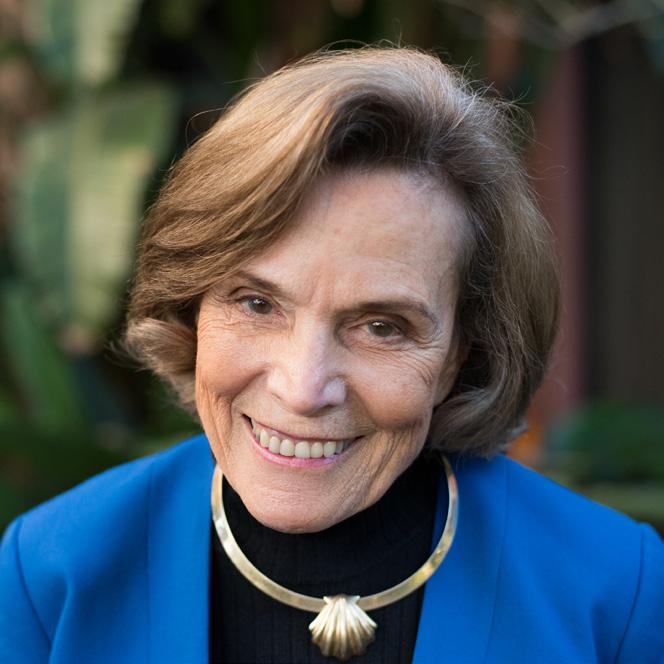


Dr. Sylvia Earle fell in love with the ocean splashing in the Gulf of Mexico near her hometown of Dunedin, Florida. As a college student at Florida State University, she logged the first of her over 7500 hours underwater. Now in her 80s, Earle is more committed than ever to continuing her mission to explore and protect the ocean.


“I am asked sometimes, ‘Well, when are you going to retire?’ Earle said. “I say, ‘Why would I? I love what I’m doing and I feel good.’ Retire to what? Getting new tires so that I can keep going? That’s what I need.”
The accolades Earle has earned are distinguished and numerous: named a Living Legend by the Library of Congress; TIME magazine’s first “Hero for the Planet;” a National Geographic Society Hubbard Medal winner; and the first woman named as chief scientist for the U.S. National Oceanic and Atmospheric Administration (NOAA). In 1970 Earle led the first all-female team of “Aquanauts,” who lived in an underwater habitat off the island of St. John in the U.S. Virgin Islands. Two weeks of living underwater changed the way she looked at fish and other ocean wildlife and cemented her life’s work.
Over five decades later, she’s not resting on her vast accomplishments. In 2008 Earle, nicknamed “Her Deepness,” founded the nonprofit Mission Blue to
inspire public awareness and support for a worldwide network of marine protected areas, with the goal of restoring the ocean. The ocean is clearly Earle’s passion, but she believes that whatever inspires us individually, there is so much for each of us to do, regardless of age.
“In my lifetime, I’ve been a witness to the greatest era of discovery and learning so far. When I was a child, no one had been to the moon. No one had been to the deepest part of the sea. No one really knew about our internal biome.
“Now we know. We can do something about things that we understand. But there’s so much more that we have to really grasp about how the world functions,” Earle continued. “We know enough to know we have to take care of the natural systems. We’ve learned so much, but we’ve also, in my lifetime, lost more of the natural world than during any time in history. So, we’re at this turning point. Aren’t you glad to be alive now?”
“I'm going to make the best use of whatever time I’ve got. I have expeditions planned for the coming 10 years. 10 years, which is a nice chunk of time to anticipate.
“But if you get locked into thinking, ‘I can't do this because,’ — whatever that because is — ‘I'm too tall, I'm too short. I'm too old. I'm too young,’ you just get held back. I don't want to be held back. I just want to keep going.”
“I'm going to make the best use of whatever time I've got. I have expeditions planned for the coming 10 years. 10 years, which is a nice chunk of time to anticipate.”
DR. SYLVIA EARLEPhoto by Kip Evans Mission Blue
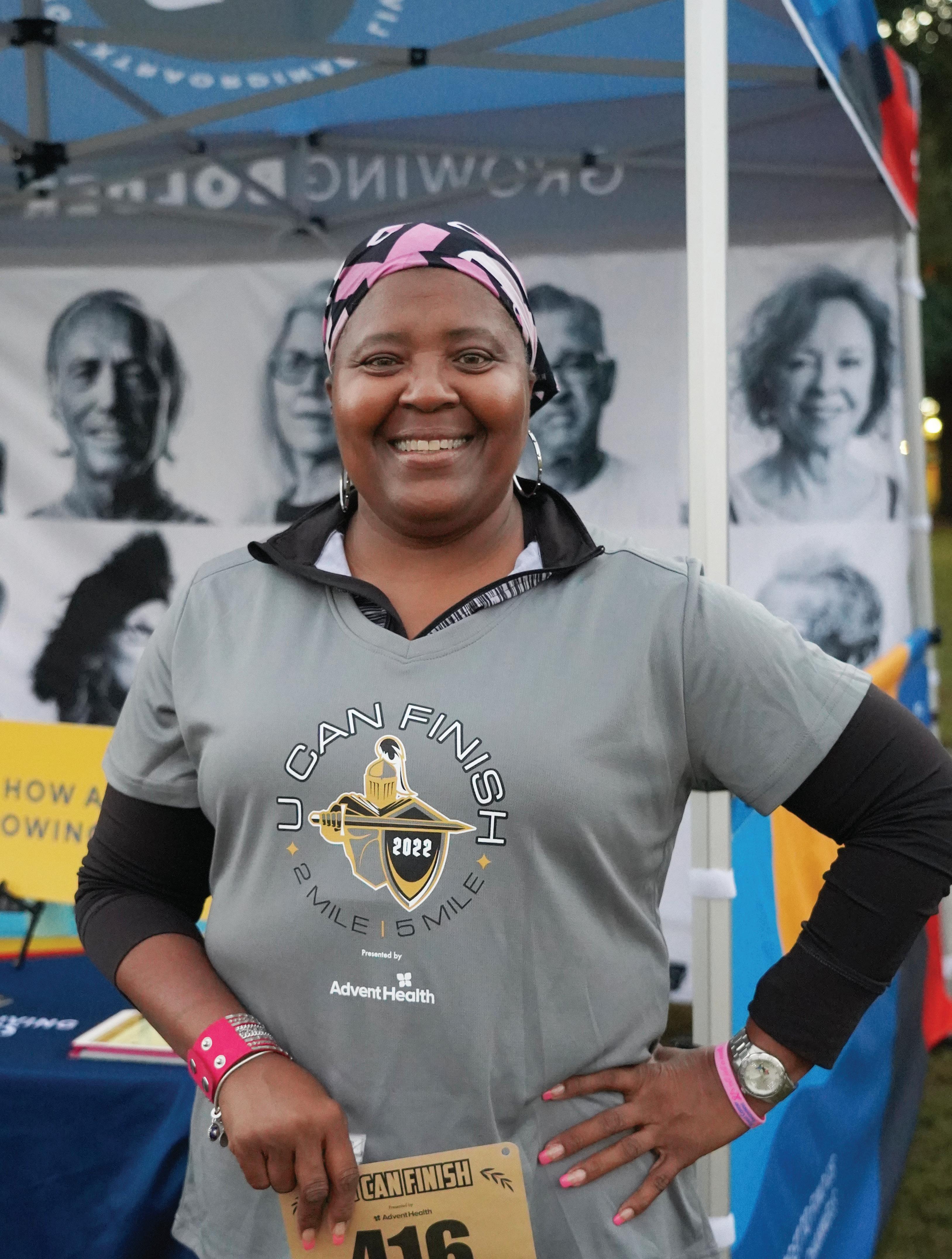
Helen Deboles thought her life was over. She was in her 40s, facing chemo, radiation and multiple surgeries for breast cancer. She had already endured too much pain and was feeling too little hope.
“The road that I traveled, there was darkness at the end. I didn't think there was a light,” Deboles, 56, recalled. “I would be in my room, and I would just try to not see anyone because I wanted to give up. I started thinking about my two young daughters, ‘What are they going to do? What are they going to do without me?’
“Something kicked into gear. I woke up, I got a kick in the butt, and I'm here. So, I'm trying to just do this thing called life and keep moving ahead to show other women and men that they can do the same. Don't just lay there and take it.”
Part of that kick in the butt was to take charge of her health and fitness. It’s why Deboles signed up for the Track Shack “U Can Finish” 5-mile race at the University of Central Florida, running in the Growing Bolder Division Powered by Florida Blue Medicare
At race time Helen was anxious, crowded in a sea of other runners of every age, every level of fitness, and every reason for being there. The start is always exhilarating, and Helen got off to a good one. She felt an inner confidence, one positive that came from nearly dying. Deboles had learned she was tougher than she thought. She had learned to harness that strength, that resolve, to fight for herself and for others, as an example. Even her sister was there at the break of dawn to watch her run.
“She got me out of bed this morning. I actually just wanted to sleep,” April Johnson said. “But I know it's so dear to her heart to be here, and it's so dear to her heart to fight, I couldn't stay in bed. So, I got on up and I came, and I'm going to be by her side all the way to the end.”
With her sister cheering, Helen was on the move. Two miles in and she was keeping a solid pace, steady and strong. But around the fourth mile, her knee began to stiffen. She tried to push through, but it kept getting worse. She wondered if she would have to stop, but Deboles knows a little something about how to deal with pain.
“Don't give up. Always push through it. Perseverance, that's what it's all about,” she recalled. “I'm going to push so I can show everyone else that you can do it, too.”
Deboles did push through. She may have slowed down, but she never quit. She powered to the end and was met at the finish line with a loving embrace from her sister. At the age of 56, she conquered a five-mile run. This 12-year cancer survivor is out to show us that we can be so much stronger than we think.
“I keep going back to perseverance,” Deboles said. “Push, push, push. It's well worth it in the end.
“I accomplished something and I didn't give up. It means a great deal because if I give up, it seems like I didn't try hard enough. I didn't want to fail myself, so that's why I kept going.”
Whether facing a daunting medical diagnosis, trying to run a race, or any challenge in between, Deboles offers this piece of advice:
“Never give up. Believe in you, and you'll make it through.”
“I'm going to push so I can show everyone else that you can do it, too.”HELEN DEBOLES
Once the face of Estée Lauder, and a Sports Illustrated swimsuit cover girl, Paulina Porizkova was one of the highest paid models in the industry. While her supermodel career was filtered by photographers and journalists, Porizkova, now in her 50s, tells her own story in the memoir, “No Filter: The Good, The Bad and The Beautiful.”
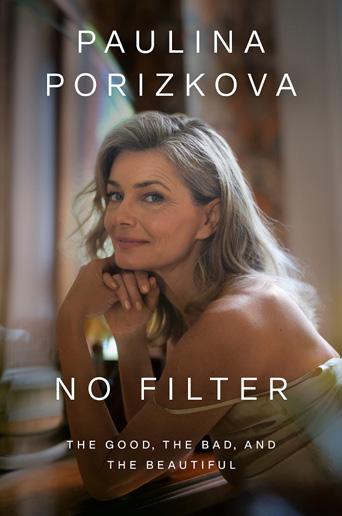

The Czech-born Porizkova was first discovered at 13, rising to modeling fame in Paris in the 1980s. As someone whose career was based on her outward appearance, Paulina has always been conscious of being judged by her looks. She acknowledges that while the messages society sends as we age may be damaging, the most potentially dangerous ones may come from inside ourselves. It’s up to us to decide what to do with the messaging.
“We have three options,” Porizkova told Growing Bolder. “We can either make ourselves look younger so that we don’t get pushed away from the main table…because there’s so many choices now that we actually can go back to looking younger. We can accept our invisibility and just quietly retire into a corner, where it seems that is where society wants us. Or we can embrace who we are and what we are and shout and say, ‘I am not ready to be invisible.’”
At just 19, Porizkova met and fell in love with the lead singer of the band, The Cars, Ric Ocasek, who was 40. The two married, raised two sons and were together for 35 years. Eventually they amicably separated but were living together when Ocasek died, following a surgery. Following his death, Porizkova learned Ocasek had disinherited her from his estate, stating “My wife is not entitled to any part of my estate, because she abandoned me.”
The shock of his death, coupled with the trauma of betrayal, led right into the isolation of the Covid-19 pandemic. Porizkova needed time to rebuild her life, on her own terms.
“You know how when you first come of age and the world is wide open to you? You’re filled with hope because you’re going to go out there and conquer the world, find love, have a house, and have a family or amazing career or whatever it is that you want to do.
“I'm in a second coming of age. This is it. My life was wiped down. Somebody gave me an unexpected gift and burnt my house down to the ground. So, I have to build myself a new one. The difference is that this time I have the tools and I know what kind of house I want.”
The memoir details her journey to this point, and her view of the possibilities ahead.
“I'm in my prime now,” Porizkova told Growing Bolder. “You might think it was back when my face was perfectly taught and plump and smooth, but no! With all the knowledge that I’ve acquired in my life and everything that I’ve done, I’m in my prime now. So there.”
FOR MORE DAILY MEMES: @GrowingBolder
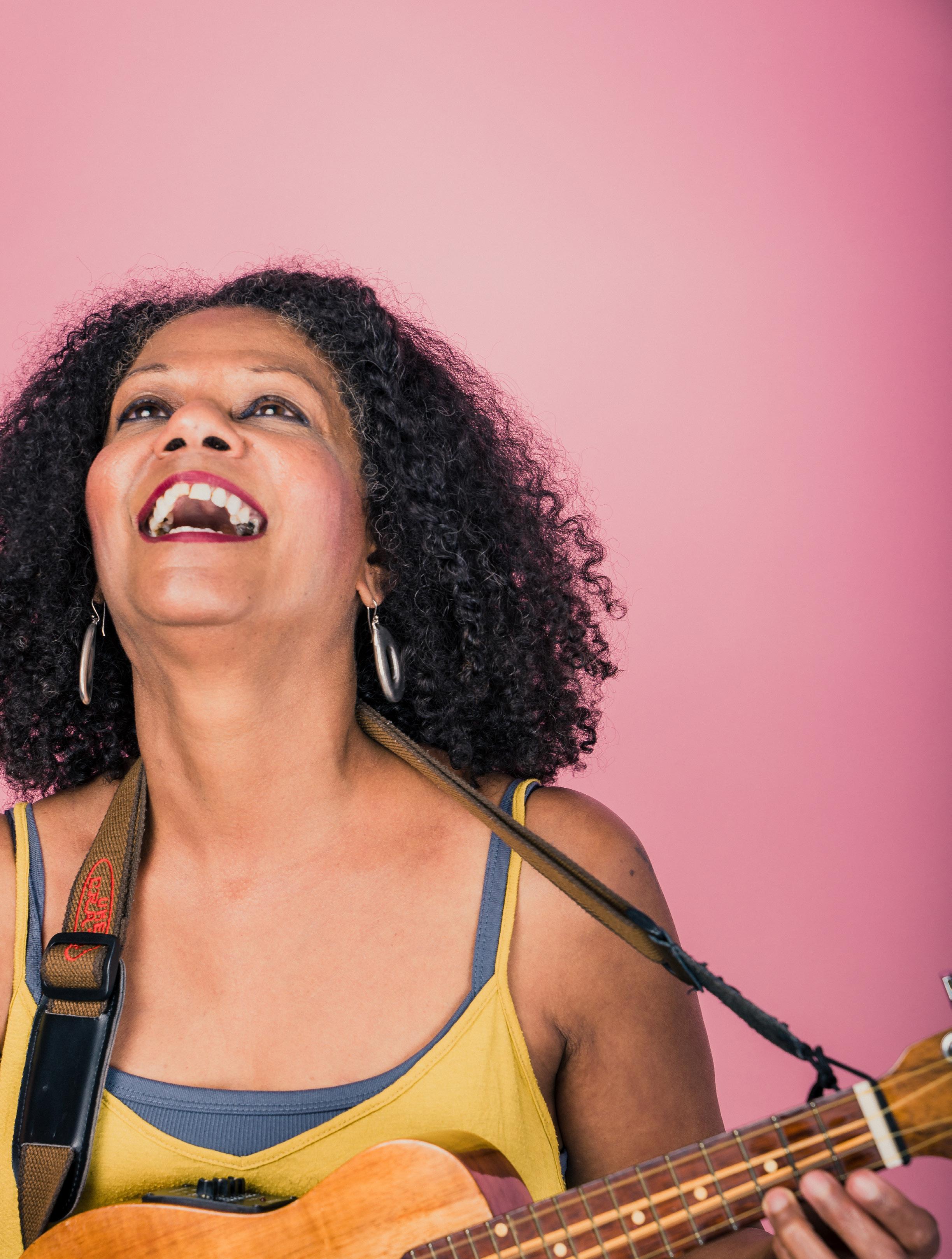 Photo by Mike Dunn for Growing Bolder
Photo by Mike Dunn for Growing Bolder
"Freeing yourself was one thing, claiming ownership of that freed self was another."
– Toni Morrison
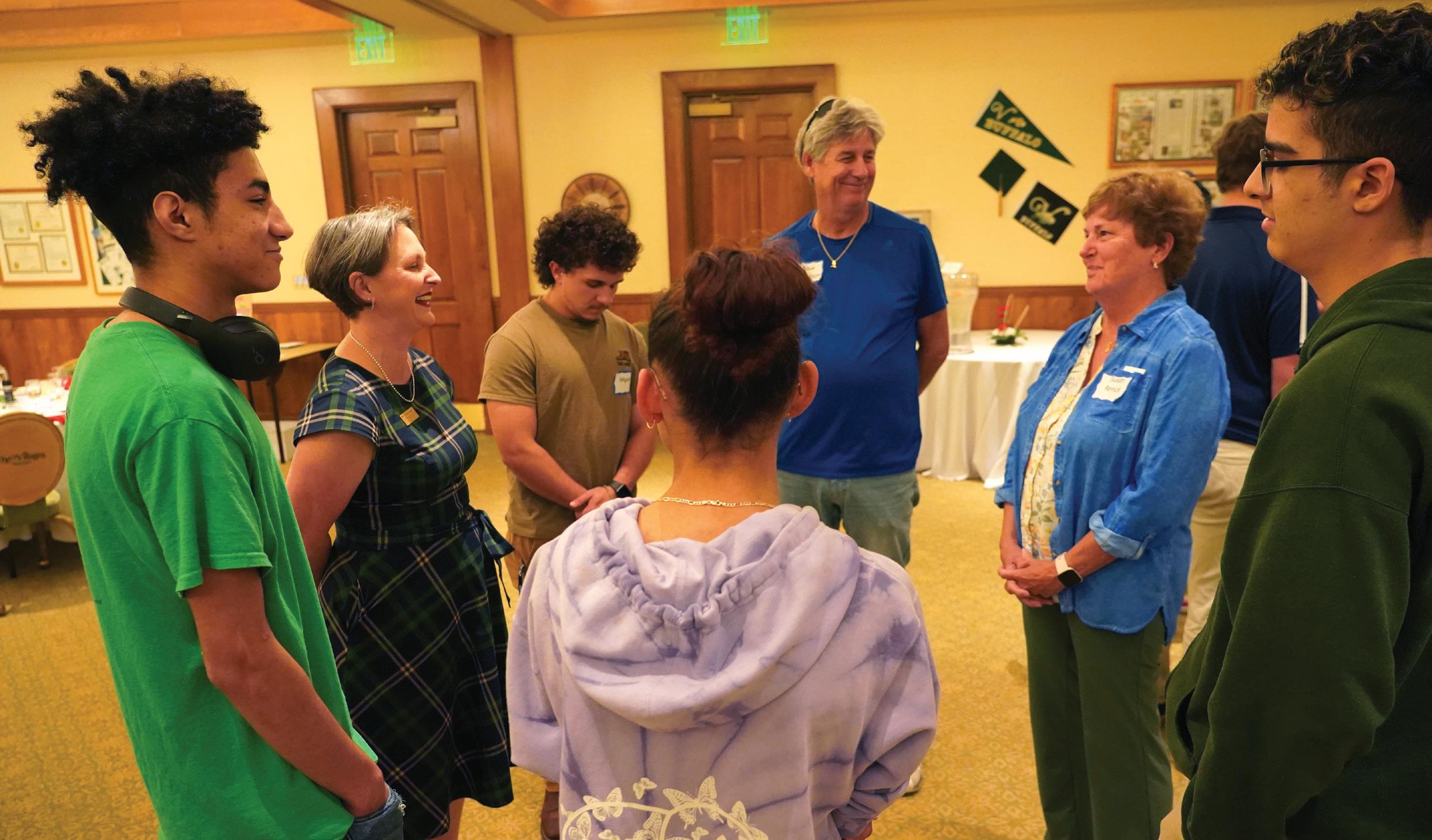
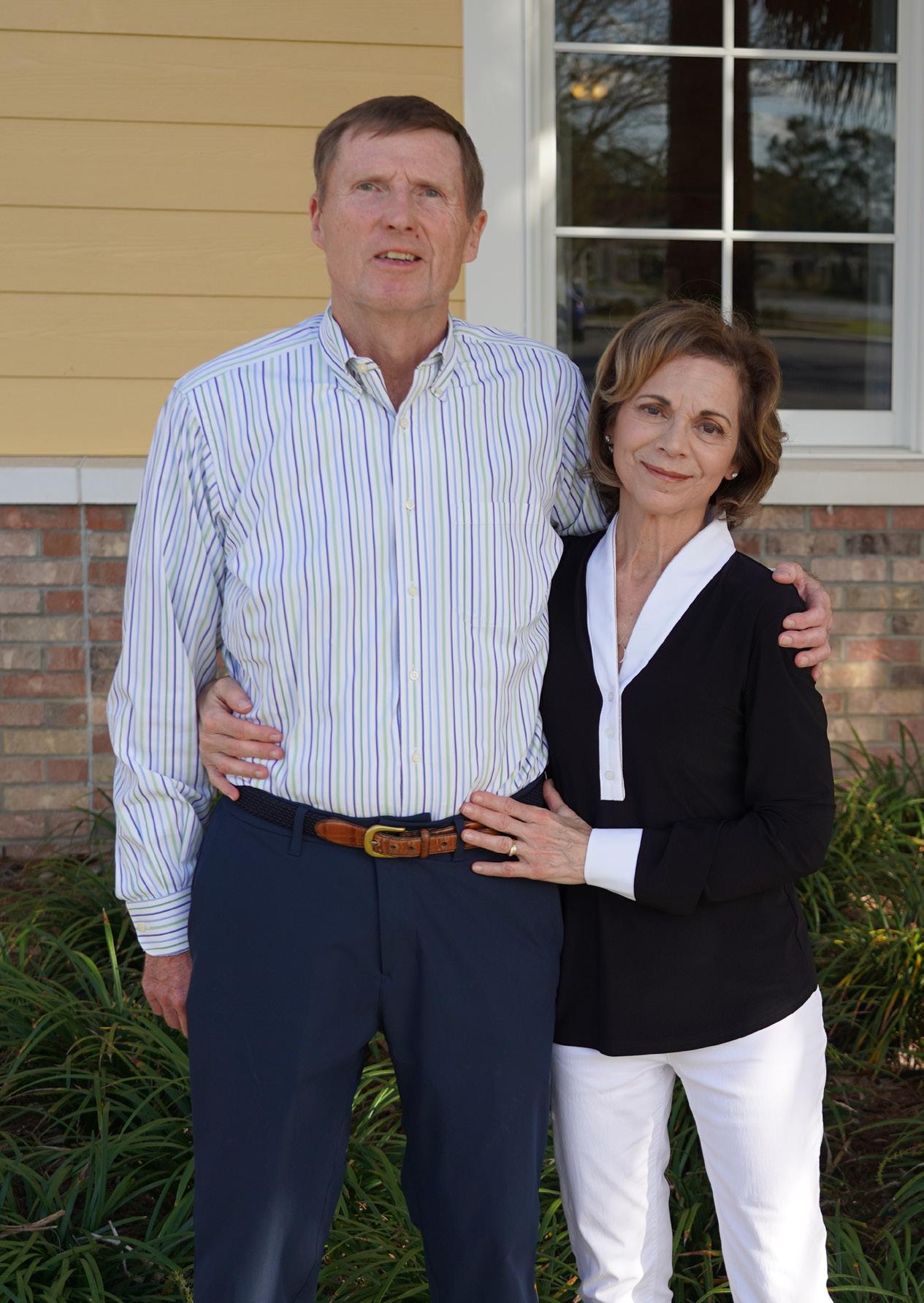
Jacquari Hurst is a 19-year-old high school senior. She has a beautiful singing voice, which she shares weekly in her church choir. She plays three different instruments in the marching band and competes on her school volleyball team. She now has her sights set on college, eagerly awaiting her freshman year at Valdosta State University. But the road to this point wasn’t easy. It was a difficult journey that required the help of others.
“I lost my sister. Last Friday made it officially one year that she passed away. She died young, 24, so it’s hurt me a lot,” Hurst told Growing Bolder’s Secily Wilson. “I never grew up with my dad around. It was just me and my mom. So, not being able to be as close as I’m supposed to be with my sister anymore, that just did it right there. I was always taught to hide my feelings, because I don’t want to feel like I’m a burden on anybody else.”
But now, Jacquari does have someone to share those feelings with. She is a beneficiary of the Florida nonprofit Take Stock in Children, which pairs at-risk, financially challenged students with adult mentors: a person to listen and help guide them through their struggles to stay on track at school, enroute to earning college scholarships.
To date, Take Stock in Children has served more than 40,000 students in Florida. Their mission is to “end the cycle of poverty through education.” It was through this program, at the age of 13, that Jacquari met Chris Baldwin, a resident of The Villages, FL who became her mentor and changed her life.

“The first time we met, I felt like that was the first time someone was taking the time to ask about her,” Baldwin, 66, said. “I just wanted to show her that I cared, and that I was very sincere and wanted to meet her where she was in life.”
“It always just feels like ‘Oh, she really cares!’” Hurst said while reflecting on her mentoring sessions with Baldwin. “She’s always going to be by my side, no matter what.”
This pair has formed a special bond, meeting weekly for the past six years to talk about the ups and downs of Hurst’s teenage life.
“It’s been a great transition from the first time I’ve met her until now,” Baldwin said. “She’s just always in there, trying. She wants to do good. I’m so proud of her.”
Chris, and her husband Gregg, who is also a mentor, took it upon themselves to expand Take Stock in Children’s efforts. They collaborated with a local organization interested in giving back, Parady Financial Group, to create a special gathering place in The Villages called the ‘Learning Lounge’ — a place where mentors and students can meet with one another, have dinner, and gain more real-life knowledge from guest speakers.
“The mission is to help the kids navigate the real world
after high school in a positive way. We like to do that through programs that talk about core values and life skills, and we want to do it with fun. We want them to be part of the solution in the world, not part of the problem,” Chris said.
“It’s just so wonderful to see these kids working hard and trying to get ahead, and being appreciative of the opportunity,” Gregg Baldwin, 70, explained.
The Baldwins have a long track record of giving back to children in need. Prior to moving to Florida, they created a non-profit in Pittsburgh, PA. Having raised a son with special needs, the Baldwins wanted to pass on knowledge and help other parents navigate the education system for their own children facing disabilities. They also started a scholarship program that has been helping high school students go to college for 15 years and counting.
Upon moving to The Villages in 2017, this passion flourished once again with the Learning Lounge, where topics range from Finance 101 to restaurant etiquette and interviewing skills to conflict resolution, how to make a great first impression, and more.
More than 20 pairs of mentors and mentees chatted over prime rib, potatoes, steamed vegetables and salads on a calm Thursday afternoon at The Villages Rohan Recreation Center. Guest speaker Karen Stange, a therapist and mental health counselor, engaged the crowd, encouraging the students and mentors alike to share their heroes, discuss their fears, reflect on their past and dream about their futures. It was an unlikely mix of backgrounds, cultures and ages brought together because of the Baldwins’ passion for empowering students.
“Throughout the Take Stock in Children program and the Learning Lounge dinners, you meet a bunch of different people,” high school senior Matthew Frisbie, 18, said. “You see people that it’s like, ‘Oh, I don’t think I’d ever meet up with you in person otherwise.’ But this program, it brought all these people together. It helped open me up and be more susceptible to other ideas.”
“If I wasn’t in this program, I probably wouldn’t have this many opportunities,” Hurst said. “It’s just that motivation. I have something to fight for at this. There’s nothing that is going to stop me. I know I have people that want me to continue and see me continue to grow.”
